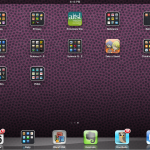I decided at some point that I wanted to be a teacher. I’m not really sure why I decided to be a teacher BUT that is what I wanted to do. My Dad sadly didn’t agree. I came home from school in Year 9 after my first Business Studies class and told my parents that I really enjoyed this class. Debits = Credits just made perfect sense and why didn’t someone tell me this earlier in life. From that moment on my Dad told the world I was going to be an Accountant. I knew that wasn’t what I wanted to do BUT DAD SAID… During my middle school years I helped out in a friend of the family’s classroom each school holidays as the school I attended finished a week or two earlier than theirs. I loved it even if all I was doing was cleaning out art cupboards and placing art work on the walls. To appease my father during Year 10 I went and did a week’s work in an Accounting firm. I absolutely hated it. I so didn’t want to be the accountant behind the desk staring at (and this is going to show my age!) page after page of ledgers. My final years of high school I followed the business course – Accounting, Economics, Legal Studies, Secretarial Studies, Maths B and English. As school was finishing I fought long and hard with my dad over which university degree I would do. We managed to compromise I could put into number 1 the duel degree of B.Ed and B.Bus as long as the rest were a B.Bus. Thankfully I was accepted into my number 1 choice….
There has been a lot of posts lately about being a teacher and going into the profession or not going into the profession… A few of these raised some questions for me. Did I go into the profession blind? Do I enjoy it? Am I still passionate? If I was to do it all over again would I? What would I have done if I didn’t become a teacher?
I had 3 very interesting and different Prac experiences while I was learning to be a teacher. The first was in a primary school (Year 7) where I learnt the basics. It was a Catholic school and while I am a Christian I am not a Catholic. It showed me that I didn’t want to work for the Catholic Education system. I enjoyed my first prac and knew that I wanted to be a high school teacher by the end of it. The second was in a very rough state school. This as private school girl this was an eye opener for me. My first lesson in the classroom was a year 7, 8, 9 level 1 Typing class. Right in the middle of the Triple the Deputy Headmaster came in and ordered half a dozen students to go and undertake a random drug test. I struggled through this prac as I learnt the unwritten rules. After this prac experience I put my degree on hold to have my family. The last prac was at a Private Independent School and I had a very good mentor who was keen to make sure that I went into the teaching profession with my eyes wide open. It was halfway through this prac that I had a bit of a meltdown. As I drove the 1 1/2 hour trip home with my husband I turned to him and said “If this is what teaching is I’m not sure its what I want to do…” The long hours were getting to me… At the end of the meltdown I had decided that it would be different when I started teaching and had my own classroom and my own students…
And it was… So did I go into the profession blind? I don’t think I did. It was different and I wasn’t prepared for all the paperwork and constant parent interactions but I knew what I was getting myself into.
As for the enjoyment of teaching. I can’t think of anything else that I would enjoy more. In fact I enjoy it so much sometimes that I forget my own family!!! I have a day here and there that get to me because I’m stressed and frustrated. And occasionally it gets me down. But the good days always outweigh the bad. The days where my students triumph and get excited about economic concepts are far greater. I believe I am still passionate about teaching I still get that spark when I start talking about statistics, the economy or that new technological find.
At the end of the day I still would have become a teacher. I became a teacher so that I could continue to learn and to share the passion I have about my areas of interest. I became a teacher so that I could inspire students to go into areas they were passionate about.
And if didn’t become a teacher I would have gone into a profession which required me to learn something new and investigate all the time.
What about you?
Related articles













